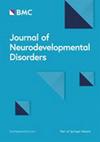Behavioral changes in patients with Prader-Willi syndrome receiving diazoxide choline extended-release tablets compared to the PATH for PWS natural history study
IF 4
2区 医学
Q1 CLINICAL NEUROLOGY
引用次数: 0
Abstract
Prader-Willi syndrome (PWS) is a rare neurobehavioral-metabolic disease caused by the lack of paternally expressed genes in the chromosome 15q11-q13 region, characterized by hypotonia, neurocognitive problems, behavioral difficulties, endocrinopathies, and hyperphagia resulting in severe obesity if energy intake is not controlled. Diazoxide choline extended-release (DCCR) tablets have previously been evaluated for their effects on hyperphagia and other behavioral complications of people with PWS in a Phase 3 placebo-controlled study of participants with PWS, age 4 and older with hyperphagia (C601) and in an open label extension study, C602. To better understand the longer-term impact of DCCR, a cohort from PATH for PWS, a natural history study that enrolled participants with PWS age 5 and older, who met the C601 age, weight and baseline hyperphagia inclusion criteria and had 2 hyperphagia assessments ≥ 6 months apart, were compared to the C601/C602 cohort. Hyperphagia was measured using the Hyperphagia Questionnaire for Clinical Trials (HQ-CT, range 0–36). The primary analysis used observed values with no explicit imputation of missing data. A sensitivity analysis was conducted in which all missing HQ-CT assessments in the C601/C602 cohort were assigned the highest possible value (36), representing the worst-case scenario. Other behavioral changes were assessed using the Prader-Willi Syndrome Profile questionnaire (PWSP). Relative to the PATH for PWS natural history study cohort, the DCCR-treated C601/C602 cohort showed significant improvements in HQ-CT score at 26 weeks (LSmean [SE] -8.3 [0.75] vs. -2.5 [0.43], p < 0.001) and 52 weeks (LSmean [SE] -9.2 [0.77] vs. -3.4 [0.47], p < 0.001). The comparison between the cohorts remained significant in the worst-case imputation sensitivity analysis. There were also significant improvements in all domains of the PWSP at 26 weeks (all p < 0.001) and 52 weeks (all p ≤ 0.003) for C601/C602 participants compared to the PATH for PWS participants. Long-term administration of DCCR to people with PWS resulted in changes in hyperphagia and other behavioral complications of PWS that are distinct from the natural history of the syndrome as exemplified by the cohort from PATH for PWS. The combined effects of administration of DCCR should reduce the burden of the syndrome on the patient, caregivers and their families, and thereby may benefit people with PWS and their families. Clinical study C601 was originally registered on ClinicalTrials.gov on February 22, 2018 (NCT03440814). Clinical study C602 was originally registered on ClinicalTrials.gov on October 22, 2018 (NCT03714373). PATH for PWS was originally registered on ClinicalTrials.gov on October 24, 2018 (NCT03718416).与 PATH for PWS 自然史研究相比,接受二氮唑胆碱缓释片治疗的普拉德-威利综合征患者的行为变化
普拉德-威利综合征(Prader-Willi Syndrome,PWS)是一种罕见的神经行为代谢疾病,由染色体 15q11-q13 区域缺乏父系表达基因引起,其特征是肌张力低下、神经认知问题、行为障碍、内分泌病变以及多食,如果不控制能量摄入,会导致严重肥胖。重氮胆碱缓释片(DCCR)曾在一项针对 4 岁及以上患有多食症的 PWS 患者的 3 期安慰剂对照研究(C601)和一项开放标签扩展研究(C602)中评估了其对 PWS 患者多食症和其他行为并发症的影响。为了更好地了解 DCCR 的长期影响,我们将 PATH for PWS 的一组患者与 C601/C602 的患者进行了比较,PATH for PWS 是一项自然史研究,招募了 5 岁及以上的 PWS 患者,这些患者符合 C601 的年龄、体重和基线多食症纳入标准,并且两次多食症评估相隔时间≥ 6 个月。多食症使用临床试验多食症问卷(HQ-CT,范围 0-36)进行测量。主要分析采用观察值,未对缺失数据进行明确估算。在敏感性分析中,C601/C602队列中所有缺失的HQ-CT评估值都被赋予了可能的最高值(36),这代表了最坏的情况。其他行为变化采用普拉德-威利综合征档案问卷(PWSP)进行评估。与 PATH for PWS 自然史研究队列相比,DCCR 治疗的 C601/C602 队列在 26 周(LSmean [SE] -8.3 [0.75] vs. -2.5 [0.43],p < 0.001)和 52 周(LSmean [SE] -9.2 [0.77] vs. -3.4 [0.47],p < 0.001)的 HQ-CT 评分有显著改善。在最坏情况估算敏感性分析中,各组间的比较仍然显著。与PWS参与者的PATH相比,C601/C602参与者在26周(所有P<0.001)和52周(所有P≤0.003)的PWSP所有领域都有明显改善。对PWS患者长期服用DCCR会导致吞咽功能亢进和PWS的其他行为并发症发生变化,这与PATH治疗PWS队列中的综合征自然病史不同。服用 DCCR 的综合效果应能减轻该综合征给患者、护理人员及其家人带来的负担,从而使 PWS 患者及其家人受益。临床研究C601最初于2018年2月22日在ClinicalTrials.gov上注册(NCT03440814)。临床研究C602最初于2018年10月22日在ClinicalTrials.gov上注册(NCT03714373)。PATH治疗PWS最初于2018年10月24日在ClinicalTrials.gov上注册(NCT03718416)。
本文章由计算机程序翻译,如有差异,请以英文原文为准。
求助全文
约1分钟内获得全文
求助全文
来源期刊
CiteScore
7.60
自引率
4.10%
发文量
58
审稿时长
>12 weeks
期刊介绍:
Journal of Neurodevelopmental Disorders is an open access journal that integrates current, cutting-edge research across a number of disciplines, including neurobiology, genetics, cognitive neuroscience, psychiatry and psychology. The journal’s primary focus is on the pathogenesis of neurodevelopmental disorders including autism, fragile X syndrome, tuberous sclerosis, Turner Syndrome, 22q Deletion Syndrome, Prader-Willi and Angelman Syndrome, Williams syndrome, lysosomal storage diseases, dyslexia, specific language impairment and fetal alcohol syndrome. With the discovery of specific genes underlying neurodevelopmental syndromes, the emergence of powerful tools for studying neural circuitry, and the development of new approaches for exploring molecular mechanisms, interdisciplinary research on the pathogenesis of neurodevelopmental disorders is now increasingly common. Journal of Neurodevelopmental Disorders provides a unique venue for researchers interested in comparing and contrasting mechanisms and characteristics related to the pathogenesis of the full range of neurodevelopmental disorders, sharpening our understanding of the etiology and relevant phenotypes of each condition.

 求助内容:
求助内容: 应助结果提醒方式:
应助结果提醒方式:


